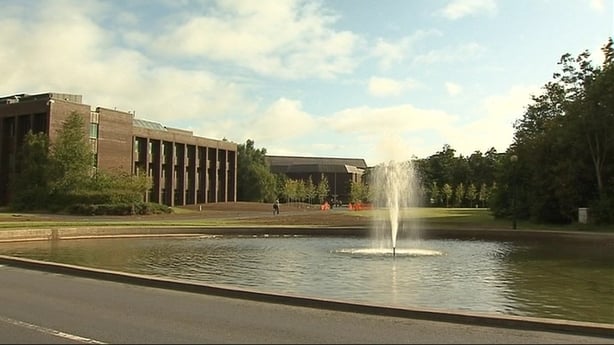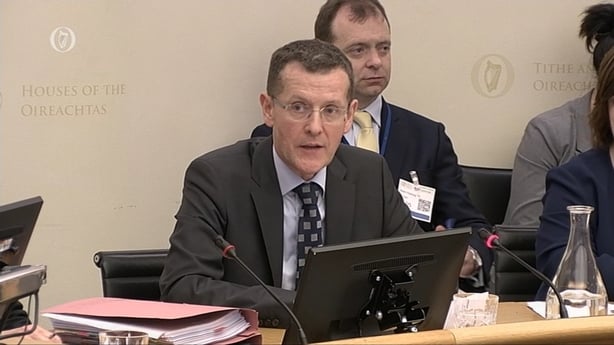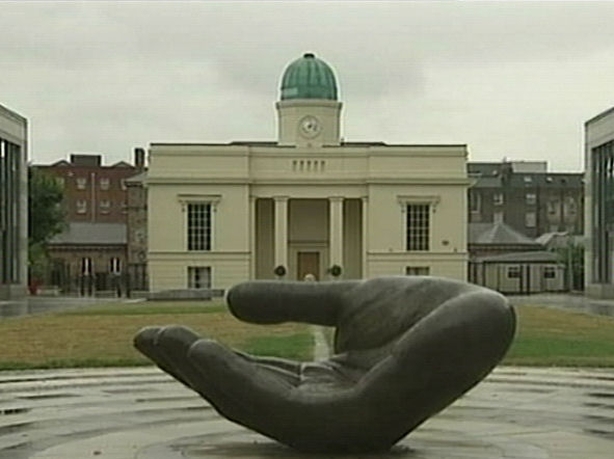The University of Limerick agreed bespoke pension deals worth €1.2m for two senior staff based on undocumented promises and no contractual obligation.
It also repeatedly misled the Comptroller and Auditor General about two separate severance arrangements - which included its Director of Finance, John Field, presenting a State audit team with a back-dated contract generated in 2015 but which was purported to have been signed four years earlier.
These were among the findings of a report by the C&AG into payments to certain staff at the University of Limerick and the Institute of Technology, Sligo.
The investigation was initiated following the RTÉ Investigates - Universities Unchallenged programme into the specific severance deals agreed by UL and wider corporate governance failures.
The report by the C&AG revealed that in December 2012 two senior executives, who were employed by one of its commercial subsidiary companies, were seconded onto the University's payroll and given the full pension benefits of core staff.
This move resulted in one of the employees getting an additional, State-backed pension benefit of €745,000 and the second, who has yet to retire, in line for an extra €424,000 in pension benefits.

Plassey Campus Centre (PCC) is a subsidiary of the University of Limerick and it is not covered by the University Code of Governance or the public service pension scheme. Its staff are supposed to be signed up to a defined contribution scheme separate to the University's public service scheme.
However, in December 2012 two senior executives of PCC were added to UL's defined benefit scheme just as it was about to be closed for good.
Neither person's contract required this and there is only limited documentation referring to it in recent years.
Despite this, in November 2011 UL's Director of Finance, Mr Field, recommended that the two staff members have their arrangements restructured so that they would be employed directly by UL and this would address any pension claims.
The C&AG report said there is no record of any consideration being given to adopting similar arrangements for the rest of PCC's staff - other than the two senior executives.
In one person's case their pension benefits should have been €396,400 when they retired in 2014, instead their pot when they retired was worth €1,140,900.
In the second case the person, who has yet to retire, will receive up to €424,000 more from their pension than they would have if the transfer had not happened.
The report found "As a result of the 2012 arrangement, they were awarded an entitlement to very significant additional pension benefits".
"The University failed to keep adequate records in relation to the assessment of the claim, the decision to second the executives and to award University pension benefits," the report said.

The C&AG's report also found that both staff members were present at the board meetings where their pension deals were discussed and there is no evidence that they stepped outside the room.
"Both senior executives are recorded in the company’s Board minutes as being in attendance at all Board meetings where the pension matter was discussed".
"The University has stated that the two senior executives were not in attendance for the matter when it was discussed by the Board from December 2010 onwards. This is not reflected in the minutes of the Board meetings," it said.
The report said two memos from UL's Director of Finance, Mr Field, to its then Director of Human Resources, Tommy Foy, were sent in 2011 and 2012 to recommend the deals.
But neither of these refer to any Governing Authority approval; projected costs for UL; the unwritten assurances on which the deals were based or the potential to add further added years bonuses under the University's pension scheme.
The report also found that when the senior staff member who benefited from the €745,000 uplift in their pension retired in 2014, Mr Field hired that person back on a one-day-a-week contract.
"The amount paid under this contract exceeded the contracted amount by just over €43,000," the report said.
This meant that in that person's first year of retirement - between the new contract and their pension - they earned €13,600 more for working one day per week than they had for working full time the previous year.
The report also looked at severance packages of two senior employees, the University’s former financial controller John Fox and its former director of lifelong learning, Dermot Coughlan.
UL had originally told the C&AG and the Department that they were arranged to avoid the cost of dismissing both men until RTÉ Investigates discovered this was not true and that there had been no performance issues. Instead, both men had been immediately rehired on separate consultancy contracts through two newly established companies.
The C&AG discovered that UL had set up the arrangements for both men and had engaged PwC to help establish companies for the two retiring employees.
The University did not go to tender because their work was deemed to be of a "specialist nature".
Mr Fox, referred to in the report as "AZ", was answerable to the then Director of Human Resources, Mr Foy.
The C&AG said in Mr Fox's case his contract was to "develop finance projects as requested, develop student marketing as requested, project manage specific HR projects as determined by the HR Division and evaluate e-tenders and EU projects to position UL to competitively compete in these areas".
But it said while "there is an indication that the consultant undertook some work on behalf of the University between June and December 2012. However, this examination has found little evidence of a meaningful business purpose for the University from the contract with AZ’s company".
The report also found that the University ignored a severance agreement template proposed by its solicitors.
And that the Director of Human Resources signed the agreements without any evidence of having been delegated authority to do so.
The C&AG's report said when its examination team looked for records as to how the payments were processed they were provided with an email from its Director of Finance, Mr Field, to one of his staff instructing him to make the payments.
The report revealed that the staff member who was instructed to process this was one of the two men who received the severance payments.
The report also detailed a timeline of events where UL had misled it and the Department of Education about these two severance arrangements - which were subject to a sector-wide investigation in May 2015.
UL’s efforts to mislead auditors included getting Mr Coughlan to sign a severance agreement in late 2015 but which was back-dated to November 2011.
In October 2015 this back-dated document was provided to the C&AG's examination team by Mr Field where it purported to be a document signed four years previously.
The C&AG said evidence given to the Public Accounts Committee about these deals was only corrected after contact from RTÉ Investigates in May 2017.
"In early May 2017, following inquiries from the ‘RTÉ Investigates’ media team, the University’s Director of Finance wrote a letter to the Committee of Public Accounts to correct the record of the March 2017 meeting, stating that there were, in fact, two issues where the University had not followed good practice. The letter did not specify the second area in which there was a departure from good practice," it said.
The C&AG said overall the reasons UL gave for agreeing to the severance packages was not credible and information had been withheld from the C&AG, the Department of Education, the Public Accounts Committee and its own legal advisors.
"The University misrepresented the circumstances around the severance deals to the Office of the Comptroller and Auditor General on a number of occasions, and did not disclose the existence of the related contracts. This undermines the audit relationship between the University and the Office," it said.
Mr Coughlan is currently suing UL for defamation arising from its untrue claim that there were performance issues that required the severance deal.
Separately the C&AG found that UL had been operating a scheme to reward staff with additional years of service to boost their pensions and that this was "significantly more generous" than a similar one run by Dublin City University.
In response the Department of Education said: "The Department intends to communicate with the University to highlight the importance of full disclosure and transparency in responding to any and all requests from the Office of the Comptroller and Auditor General.

"The Department also intends to request confirmation from the University of the specific action it proposes to take in response to the instances of misrepresentation which have been identified," it said.
In a statement carried on behalf of UL President, Dr Des Fitzgerald, the report said the University had changed since matters came to light in May 2017.
"Since coming into office in May 2017, I have put in place a new management structure, in particular the appointment of a Chief Operating Officer and Registrar to which Human Resources and Finance report.
"There is ongoing restructuring of the new portfolio including making changes in Human Resources and Finance. In addition, the subsidiary companies have been restructured," it said.
In a completely stand alone part of the report the C&AG examined certain payments to staff at IT Sligo.
It said IT Sligo entered into a settlement worth over €202,000 with a former employee, when it only had sanction to pay just over €37,500.
And the way it characterised part of this deal to the Department fell "short of the levels of transparency expected of public bodies".
In a statement carried on behalf of IT Sligo, it said it will no longer enter into confidentiality agreements which prevent it providing full information to the Department.







